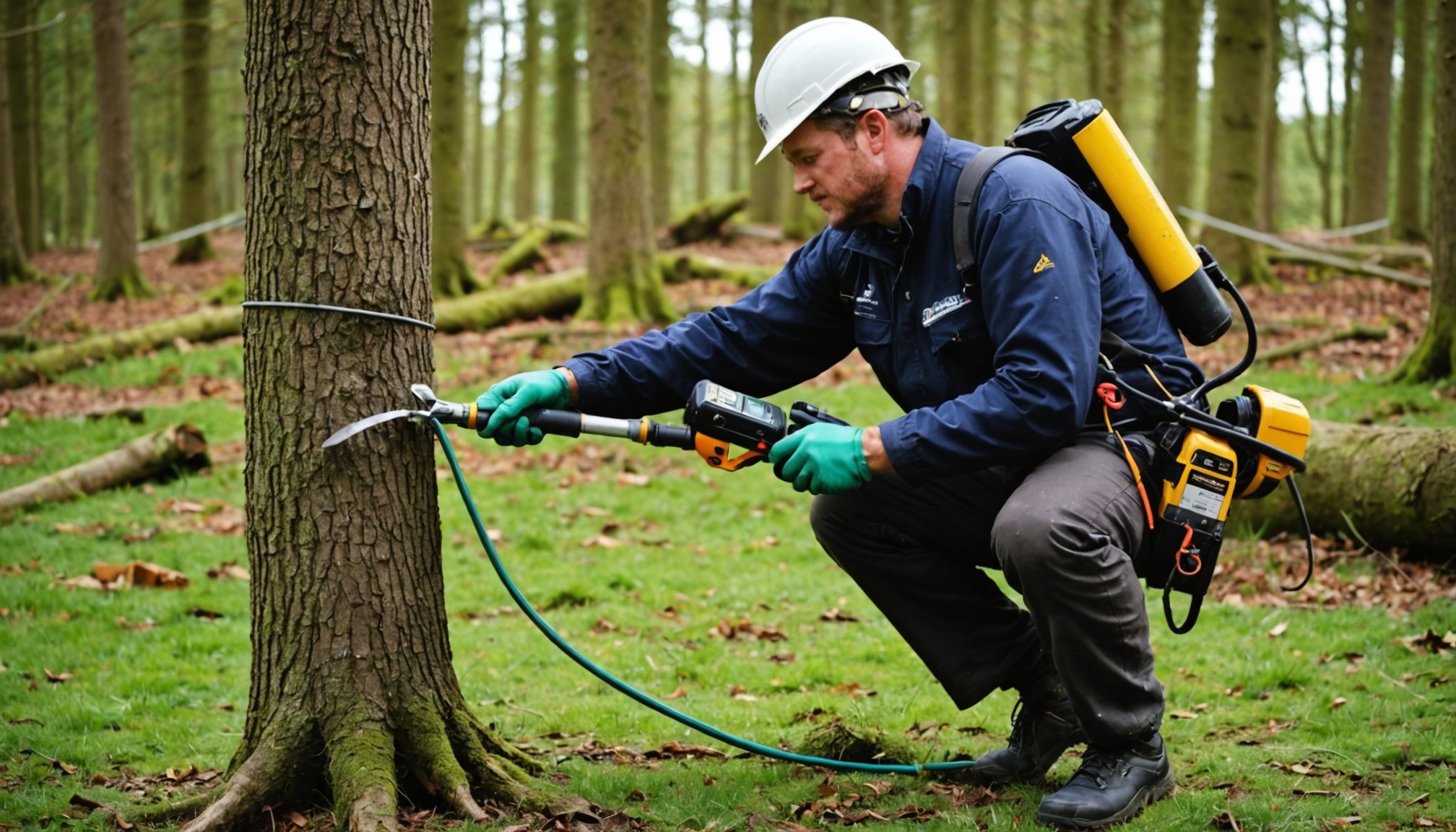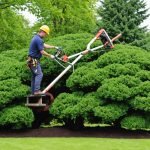Pursuing tree surgeon courses in Kent offers a practical pathway to a rewarding career in arboriculture. These programs combine hands-on training with industry-recognised qualifications, ensuring you develop essential skills quickly. With options designed for all skill levels and expert instructors guiding your progress, now is the ideal time to invest in your future as a professional tree surgeon.
Comprehensive Tree Surgeon Training Programs in Kent
Tree Care Training offers a variety of tree surgeon training programs tailored to meet the needs of aspiring and practicing arborists. Kent boasts an array of intensive and modular courses designed to provide comprehensive skills in tree care, safety, and technical operations.
Topic to read : Ultimate guide to ceramic coating services in kent
Course Options and Structure
These programs are structured with clarity and focus. They include practical assessments aligned with industry standards, such as Lantra Awards and NPTC units. The courses often combine classroom learning with hands-on training in real-world environments, enhancing skill retention.
- Intensive and modular courses provide flexibility for learners from different backgrounds.
- Key features include duration, which varies from short workshops to four-week comprehensive programs.
- Course costs reflect the thorough nature of the training, including equipment hire and PPE options.
Accreditation and Career Development
Accredited certifications like Lantra Awards and NPTC units are vital for career advancement. They verify the trainee’s competence in essential areas such as tree felling, aerial rescue, and chainsaw operation. This recognition opens pathways into various employment options, from local authorities to private tree care services.
In parallel : Unlock stylish privacy with frosted window film solutions
You can view more details on this page: Tree Care Training. These certifications also facilitate continued professional development, enabling arborists to stay current with safety standards and new techniques.
Course Highlights
- Duration ranges from several days to four weeks, depending on certification levels.
- Costs are competitive but include high-value practical assessments.
- Safety standards are paramount, with strict prerequisites on physical fitness and mental alertness.
- Experienced instructors and state-of-the-art facilities ensure high-quality training environments.
Prospective students are encouraged to explore these options to develop confidence and competence in tree surgery. Enrolling in approved programs guarantees that learners meet industry requirements and are well-prepared for the complexities of modern arboriculture.
Tree Care Training provides a structured approach to acquiring recognised qualifications relevant to your career ambitions.
Detailed Course Offerings and Curriculum
All-Inclusive Training Modules in Kent
Arboriculture certification courses in Kent are structured to deliver both theoretical knowledge and intensive hands-on skills through practical tree surgery workshops. These tree surgeon training programs are aligned with industry-standard tree surgeon certification and cater to beginners as well as professionals seeking specialist skills or certification renewal. The curriculum encompasses chainsaw maintenance, safe felling methods, and processing trees up to 380mm, ensuring that trainees are prepared for the practical aspects expected in professional tree care training.
Further, these professional tree care training modules typically incorporate tree climbing skills courses and aerial rescue for arborists. Trainees will regularly participate in outdoor practical training sessions involving real trees and advanced climbing and rigging equipment use. For those aiming to develop advanced tree pruning techniques, many workshops feature direct, supervised experience under trained assessors, ensuring the knowledge gained can be immediately applied on the job.
Course Structure, Duration, and Learning Outcomes
Most arboriculture certification courses in Kent run from a few days up to several weeks depending on the qualification level. For example, comprehensive tree surgeon training programs may extend over four to six weeks, combining both classroom instruction and in-the-field modules. These practical tree surgery workshops prioritize health and safety in arboriculture, with mandatory chainsaw safety training and in-depth first aid training for arborists.
Specific learning outcomes are mapped against industry-recognized tree surgeon qualifications, ensuring that every graduate can demonstrate competency in essential techniques, such as tree felling methods training, emergency tree felling procedures, and professional tree health assessment workshops. The course structure allows flexibility for part-time and full-time options, with additional workshops focusing on urban tree maintenance training and ecological tree management classes.
Certification and Qualification Pathways
Completing these arboriculture certification courses leads to industry-standard tree surgeon certification. Qualifications are awarded by recognized bodies such as City & Guilds NPTC and Lantra Awards. Successful candidates receive certification levels in tree surgery that are respected across the UK tree care education sector. To ensure ongoing compliance and expertise, many programs incorporate certification renewal courses and stress the significance of PPE requirements for tree surgeons as part of test procedures for competency certification.
Graduates from these practical tree surgery workshops are well-prepared for job prospects in tree surgery, entry into local authority approved tree surgeon courses, or further specialisation in areas like tree risk assessment courses or soil and tree nutrition classes. These pathways allow both career starters and experienced arborists to steadily progress through continuing professional development for arborists and achieve advanced skills in professional tree care training.
Quality and Effectiveness of Training Providers
TKF Training: Industry Reputation and Candidate Feedback
TKF Training is widely recognised for its intensive tree surgeon training programs, which are structured to fast-track learners towards industry-recognized tree surgeon qualifications. The courses are divided into clear, modular units, blending practical tree surgery workshops with theoretical content. Participants consistently highlight the high standard of professional tree care training delivered by experienced instructors, which prepares them thoroughly for assessments. Emphasis is placed on both chainsaw safety training and tree climbing skills courses, with expert supervision ensuring safety and competency. Small group sessions enhance hands-on practice with real trees, enabling direct application of learned skills.
Physical fitness and a readiness for outdoor practical training sessions are prerequisites, reflecting the demands of the field and the rigorous health and safety in arboriculture standards. Notably, TKF Training’s exceptional pass rates in skills assessment for tree surgeons and chainsaw maintenance and repair illustrate strong candidate proficiency. Training center locations UK-wide attract clients from a variety of sectors, leveraging tailored arboriculture certification courses suited to each environment.
Kingswood Training: Comprehensive Courses and Assessment Success
Kingswood Training stands out for its focus on comprehensive tree surgeon course reviews, with a reputation for quality across both practical and theory aspects of training. The programs are designed to deliver industry-standard tree surgeon certification through a series of local arborist classes and advanced tree pruning techniques. Instructors at Kingswood are seasoned professionals, ensuring high standards for safe use of equipment and adherence to mandatory safety standards in tree surgery.
Courses are delivered in purpose-built settings, providing relevant UK tree care education combined with practical assessment criteria for courses. The curriculum includes chainsaw safety training, aerial rescue for arborists, and advanced techniques for hazardous tree handling, all underpinned by a commitment to legal compliance and safe practice. These strengths consistently support high first-time pass rates and positive tree surgery course reviews, making Kingswood a preferred option for those seeking industry recognized tree surgeon qualifications.
DTE Academy: Modular Courses and Practical Training Options
DTE Academy’s flexible model is designed for those seeking certified arborist qualification with accessible entry requirements across Kent. Their program suite features a modular approach, accommodating both beginners and those advancing expertise in areas such as emergency tree felling procedures and tree survey report writing. All practical sessions are run at well-equipped locations, cementing DTE’s reputation among regional tree surgeon training options by providing both essential and advanced content—from soil and tree nutrition classes to eco-friendly tree management techniques and PPE requirements for tree surgeons.
One of DTE’s notable advantages is the inclusion of diverse training formats, such as part-time and full-time training options, covering the core syllabus details necessary for obtaining industry recognized tree surgeon qualifications. Although course fees and funding details require direct inquiry, the blend of comprehensive arboriculture certification courses and ongoing professional development for arborists ensures that participants are well prepared for both immediate tree surgeon jobs after training and long-term career progression after certification within the broader tree care industry.
Cost, Certification, and Job Prospects Post-Training
Course Fees, Funding Options, and Equipment Costs
Tree surgeon course fees and funding play a pivotal role for prospective candidates. The costs for a comprehensive set of arboriculture certification courses, such as those at leading training centres in Kent, typically total in the thousands of pounds. Full training programs, covering everything from chainsaw safety training to advanced tree pruning techniques, often have prices ranging from £3,000 to £4,000, depending on the depth and length of the courses. These programs bundle key elements such as chainsaw maintenance and repair, tree climbing skills courses, and health and safety in arboriculture into intensive modules.
Applicants should also plan for additional expenses. Personal Protective Equipment (PPE) and equipment hire are generally not included in the headline course cost, with fees for these extras usually set by the training provider. Some centres offer rental options for essential tools, while others expect learners to supply their own. Funding options, including support via government schemes and scholarships for professional tree care training, may be available—especially for those entering through apprenticeships or returning service leavers. When calculating tree surgeon course fees and funding, prospective students should consider the possibility of partial subsidies or staged payment plans that can help manage the financial commitment.
Certification Requirements, Renewal, and Continued Professional Development
Attaining an industry-standard tree surgeon certification requires passing practical and written assessments across a suite of courses—typically following City & Guilds NPTC or Lantra frameworks. The path usually begins with foundational arboriculture certification courses, progresses through practical tree surgery workshops, and concludes with specialized skills like tree felling methods training or aerial rescue for arborists. Entry requirements for tree surgeon courses are usually minimal, focusing primarily on physical fitness and a readiness for hands-on learning.
Certification renewal courses are essential to maintain compliance with health and safety in arboriculture standards and legal obligations in the UK. Most certifications must be refreshed on a regular basis—commonly every three to five years—depending on the specific discipline and legislation changes. Some providers offer bundled renewal and continued professional development sessions that incorporate updated chainsaw safety training, PPE standards update training, and new regulations on ecological tree management classes. This ongoing professional education ensures tree surgeons remain current and employable, with the ability to pursue career progression after certification.
Employment Opportunities and Pathways in Tree Surgery
After completing professional tree care training, graduates find that employment opportunities are diverse and regionally robust. Tree surgeon jobs after training exist with local authorities, major landscaping firms, utilities, and private landowners. Many training programs integrate or support tree surgeon internships and work placements, providing both experience and introductions to industry contacts.
For those possessing certified arborist qualifications and practical experience gained from advanced tree pruning techniques modules, the tree surgery sector offers viable career progression after certification. Some roles include supervisory positions, project management for forestry management certifications, or specialists in urban tree maintenance training. Continued professional development supports those looking to diversify into niche areas such as ecological tree management classes or tree risk assessment courses.
Success in the field is anchored in the completion of industry recognized tree surgeon qualifications, a firm grasp of PPE requirements for tree surgeons, and clear understanding of mandatory safety standards in tree surgery. This comprehensive training, combined with up-to-date certification renewal courses, lays the groundwork for a sustainable and rewarding career path.
Safety, Practical Skills, and Additional Training Opportunities
Safety Standards, PPE, and Equipment Handling
Health and safety in arboriculture are foundational in all tree surgeon training programs. Across professional tree care training, both regulations and daily routines demand a stringent focus on PPE requirements for tree surgeons. PPE standards cover items such as helmets with visors, cut-resistant gloves, chainsaw trousers, ear defenders, and robust footwear—these are non-negotiable for anyone attending outdoor practical training sessions. Before any chainsaw safety training or tree climbing skills course, participants undergo instruction on the selection and inspection of PPE, understanding that well-maintained, compliant kit is the first line of defence against common workplace injuries.
Mandatory safety standards in tree surgery also mandate structured briefings on equipment handling. During chainsaw maintenance and repair workshops, candidates must demonstrate competence with tools before commencement of fieldwork. The emphasis is on meticulous checks, safe operational methods, and immediate reporting of defects. These principles are integral not only in preparation for industry-standard tree surgeon certification, but also in the responsible daily practice expected of certified arborists.
Practical Assessments: Climbing, Rigging, and Chainsaw Skills
Practical tree surgery workshops are centred on outdoor practical training sessions where candidates bring theoretical knowledge into real-world practice. Mastery of both tree climbing skills course content and advanced tree pruning techniques is achieved through incremental challenges—from simple ascents to multi-point rigging scenarios performed at height. Trainees are directly observed as they hone their climbing and rigging equipment use, with safety instructors guiding every phase.
Tree felling methods training and stump removal training further stretch these capabilities, blending procedural knowledge with direct hands-on evaluation. Every session is structured around test procedures for competency certification. Feedback is immediate and detailed, with clear references to PPE requirements for tree surgeons and best practices in the use of all machinery and tools. The focus remains on precision, caution, and teamwork, which are echoed in real work situations encountered post-certification.
Emergency and Aerial Rescue Training for Tree Surgeons
Specialist modules within professional tree care training now universally include emergency tree felling procedures and aerial rescue for arborists. These units are considered core components of health and safety in arboriculture as enforced by current industry regulations. Candidates participate in staged emergency drills that simulate real hazards—such as equipment malfunction aloft or sudden weather changes during a tree climbing skills course.
Beyond physical drills, the training encompasses first aid training for arborists, further reinforcing a safety-first mindset required for employment in both commercial and local authority approved tree surgeon courses. This commitment ensures that every participant, regardless of background, can assess risks, communicate effectively during incidents, and respond swiftly with appropriate safety equipment and procedures. The result is a workforce prepared to maintain safety under the demanding, unpredictable conditions of arboriculture, providing reassurance to employers, the public, and the wider community.











